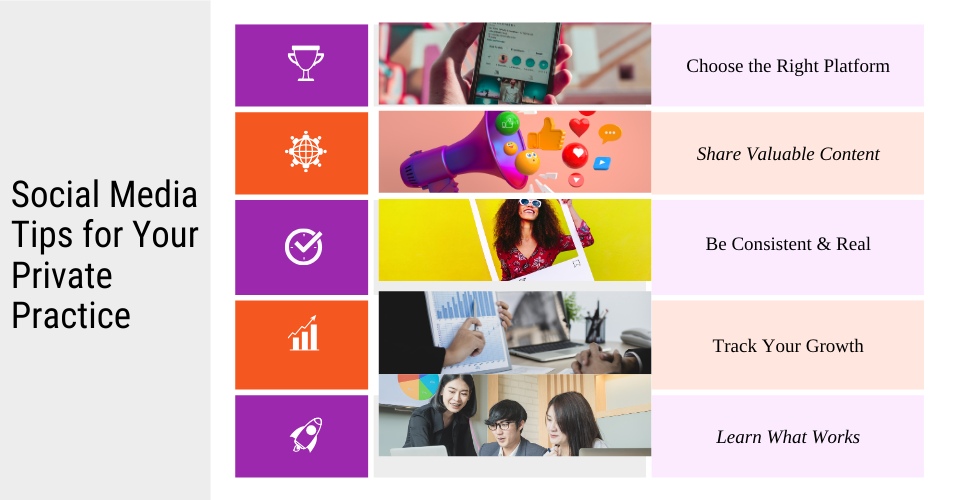Social media is not just for selfies and funny videos anymore—it is a powerful way to help more people find your private practice. Whether you are a therapist, counselor or healthcare provider, social media can be a big help and also a great way to grow and make people trust you more.
But here is the hard part: Many practice owners do not know what to post, where to start, or how to connect without feeling salesy or lost in the noise. It can feel confusing and even overwhelming.
The good news? You do not have to be a tech genius to make this work. In this guide, we will skim through how to use social media for private practice in a simple, human way that feels right for you—and helps your wellness service grow with care and confidence.
Understanding the Importance of Social Media for Private Practice
Social media is not just about staying trendy. It lets therapists tap into lots of great perks that help grow and keep their practice stable and strong. When therapists use social media, they can become well known, build their seriousness and credibility, and connect with people who matter to them. An active presence online allows clients to know who you are as well as what you stand for.
-
Building Brand Awareness
Social media gives you an opportunity to highlight your expertise, your core values, and the special services you offer. By consistently sharing informative and helpful content, people begin to associate your name with trust and authority in mental health care. Being transparent about your mission and approach helps potential clients feel more comfortable reaching out.
-
Engaging with Existing and Potential Clients
Social media is a super quick way to connect directly with both new and existing clients right from the start. From answering questions people ask in the comments section to sharing those sweet gems of insight, you can really connect on a deeper level. Engagement helps build trust, as people can see your human side and approachability before they ever step into your office.
Steps to Effectively Use Social Media for Your Private Practice.
So, are you ready to dive into social media marketing for therapists? Here is how you can maximize your time and energy.

-
Choose the Right Platform for Your Audience
Find out where your ideal clients are spending their time online. Social media platforms such as Facebook and Instagram are extremely efficient at reaching large numbers of people. If you work mostly with corporate professionals or offer career-focused counseling, LinkedIn could be a better option for you.
-
Create Valuable and Engaging Content
Your content should provide value to your audience. Share tips for maintaining mental health, post motivational quotes, or create short videos explaining therapy topics. Your tone should always be casual, approachable, and friendly in your writing. Consistency here is key—you want people to rely on your posts for positivity and direction.
-
Be Consistent and Authentic
Your audience will connect with you more if you are genuine. Share posts regularly, but do not try to be someone you are not—it shows. Authenticity builds trust. If you have expertise in a certain field, do not be afraid to own it.
-
Utilize Analytics to Track Growth
Most social platforms have built-in analytics tools. Track engagement levels, follower counts, and other key data to see how your posts are performing. With this feedback, you can grow and refine your algorithm over time. Understand What Works: These tools are an integral part of smart health and wellness marketing strategies, telling you exactly what resonates best with your audience.
Overcoming Common Challenges in Social Media Marketing for Therapists

Sure, marketing your practice online is hard work, but with some good plans and strategy, you can deal with those challenges well and keep it neat and right at the same time.
-
Maintaining Professional Boundaries
It is really important to keep personal and professional life separate online. Use a dedicated account for your practice, and always maintain client confidentiality. Respond to inquiries professionally without overstepping boundaries.
-
Time-Effective Social Media Management
-
Handling Negative Feedback
Receiving criticism or negative comments comes with the territory of being on a public platform. Stay calm and address feedback professionally. A well-handled response can demonstrate maturity and understanding, leaving a positive impression on other followers.
The Bottom Line
Using social media for private practice opens new doors for growth, connection, and education. Its potential is enormous, from establishing trust to interacting directly with clients. Take small steps, give it time, and most importantly, stay real. Social media is not just about promoting yourself—it is about building relationships and helping others.
So, take that first step today. Whether this is your first update or you need to refine what you have already established, using social media can become an indispensable part of your practice. The sooner you begin, the faster you will see results!






